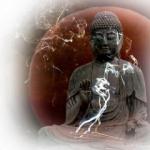There is a teaching in the Dzogchen Buddhist tradition that I want to share with you. This is a form of mind training, but different from some other teachings in it’s depth. This is a preliminary teaching but it goes all the way into some difficult concepts that usually aren’t considered approachable for beginners. For this reason, this is a good teaching to study whether one has been practicing a long time or one is just starting out.
This teaching is called The Seven Mind Trainings and it’s a list of things for us to contemplate.

In “The Seven Mind Trainings: Essential Instructions on the Preliminary Practices” by Longchen Rabjam he labeled them in this way:
1) Impermanence
2) Fleeting and lasting happiness
3) The various circumstances that lead to death
4)The pointlessness of all mundane endeavors
5) The virtues of the Buddha
6) The guru’s instructions
7) Nonconceptuality
I’ll be doing some writings building on these teachings over the next few weeks, but we’ll explore each of them a little now.
Contemplating Impermanence
We tend to think we can hold onto things but we can’t. The truth is we are losing things all the time and we all know that. You can’t hold onto anything in this world. This could really frighten us, or we can work to keep in mind that this means the things we don’t like pass too. Reflecting on impermanence helps us to not try to cling to tightly to everything all the time. It also helps with our tendency toward self obsession.
Longchen Rabjam says, “Without getting distracted, even for a moment, ask yourself wholeheartedly, ‘I wonder if I will die this evening, or perhaps tomorrow?’ All sentient beings that you see will die as well, so meditate on the thought ‘When will these beings pass away?’ Contemplating in this way will help you see that all conditioned phenomena are impermanent by nature. Seeing them as examples of impermanence will help your mind become more focused. The purpose of meditating in this manner is to turn your mind away from impermanence.”
Contemplating Fleeting and Lasting Happiness
The joys in life are fleeting. When you buy a new car, you really enjoy and appreciate for a short time, then it becomes just an ordinary part of your life. We think this way about many things in life. We tend to think, “if I can just get that partner, or that job, then I can finally be happy.” The truth is though when we have big things that we think will finally bring us happiness, it’s usually not as wonderful as we think it will be. And sometimes we get the thing we want and it turns out…we should have wanted something else.
Longchen Rabjam says, “When you think wholeheartedly that all activities end up causing suffering, you will have familiarized yourself with mind training. The purpose of meditation in this way is to elicit a feeling of disenchantment and disillusionment with the suffering of samsara.”
Contemplating the Various Circumstances that Lead to Death
This all feels very dark, doesn’t it? You could die tomorrow. How does thinking about that help?
Like impermanence and the fleeting nature of happiness thinking about this helps us to try to stop being so self obsessed all the time. But it does more than that. Knowing that we’re all in this situation where we could die at any time, that we’re all in it together, really should make us be nicer to other people. It should help us avoid fighting over things that aren’t ultimately all that important. We don’t usually think that way, but we could. We can learn how to stop doing things that harm ourselves and others and how to stop engaging so much in negative behaviors like gossip.
Longchen Rabjam says, “Think to yourself, ‘I must focus solely on virtue!’ With this in mind, reflect on all the good and bad circumstances of the past, what you are doing in the present, and what you will do in the future. Cultivate a sense of disenchantment, and focus your mind. When compassion toward all six classes of beings manifests and you enthusiastically think of all your activities as an offering to the Three Jewels and your guru, you will have mastered this mind training. Meditating in this way serves to elicit the prerequisite of faith.”
Contemplating the Pointlessness of All Mundane Endeavors
The point of this is to compare our ordinary life with our spiritual life. If we engage the teachings, spiritual Enlightenment could be within our reach. If we engage the teachings, we could suffer less and love more. This would be a wonderful thing for us. So what we’re doing is comparing the normal ordinary things we are doing with the spiritual things we could be doing. I can do my meditation practice in the morning instead of taking time to numbly scroll Facebook before I have to go to work. So can you.
Longchen Rabjam says, “What a waste to have spent your time on pointless pursuits: getting caught up in attachment and aversion, quarreling with others, hoping to hear pleasant things and not to hear anything unpleasant, pursuing pleasure and avoiding pain, accumulating and hoarding things, and so on.”
Contemplating the Virtues of the Buddha
The historical figure we call the Buddha overcame suffering and learned how to live in an awakened way. He was just an ordinary person like we are, so we have the ability to attain what he did.
Longchen Rabjam says, “Tell yourself, ‘Since buddhahood cannot be attained without meditating, it is essential that I do so. I must practice with perfect concentration, following the example of the amazing, accomplished masters of the past, who endured hardships and lived in isolated places on their quest for liberation.’ This will serve to strengthen your resolve in meditation.”
Contemplating the Guru’s Instructions
I’ll be honest, this is the one I struggle with. The message I’m taking from it is that we should really take it seriously when we receive spiritual teachings. And anyone that shares spiritual teachings with us should be held in high regard.
Longchen Rabjam says, “For this mind training, ponder the reasons for practicing the guru’s instructions. Consider how the guru is the one who will guide you across the boundless ocean of samsara to liberation. The guru’s instructions, like a great vessel, will liberate you.”
Contemplating Nonconceptuality
This is the mind-blowing part. We’re just going to jump into talking about a mind that’s free of concepts. How can we even talk about that? In his teaching Longchen Rabjam includes three forms of nonconceptuality: bliss-emptiness, clarity-emptiness, and reality. He gives a brief guidance on reflecting on each of these and I’ll include those here.
The Nonconceptuality of Bliss-Emptiness: “Imagine the syllable HAM at the upper end of your central channel and an AH symbol at your navel. Fire blazes forth from the AH and hits the HAM, causing a stream of nectar to descend, filling the four root chakras and all the secondary chakras. This, in turn, causes bliss-emptiness to arise. As you visualize this, pull the lower energy up, press the upper energy down, and focus on a white AH syllable at your heart center. This will produce the empty knowledge that utilizes the skillful means of bliss.”
The Nonconceptuality of Clarity-Emptiness: “Begin by expelling the stale breath three times. As you inhale, imagine that all external appearances and objects melt into light, merge with blue space, and then completely fill your entire body. Finally, join and hold the energies. This will generate clarity-emptiness.”
The Nonconceptuality of Reality Itself: “Relax the body and mind from deep within. Without moving your eyes, meditate in a state free from the comings and goings of thoughts. By meditating in this way, you will be able to concentrate on whatever you direct your attention to, after which you will be able to rest for longer and longer periods in a nonconceptual, space-like, state. When this comes to pass, you will have mastered this practice.”
I’m going to leave that there without a comment from me for now. I will write something about this heavy idea later.
I’ll close with one more quote from Longchen Rabjam.
He said:
“The merits of realizing impermanence are infinite:
You will abandon the faults of samsara and accumulate all the virtues naturally.
You will be freed from grasping at concepts of eternity and will dissolve attachments to loved ones and hatred to foes.
You will swiftly attain the nectar-like deathless state (buddhahood)”
The quotations in this article and the teachings referenced can be found in the book “Steps to the Great Perfection” by Jigme Lingpa. This book can be found here: https://www.shambhala.com/steps-to-the-great-perfection-15118.html












